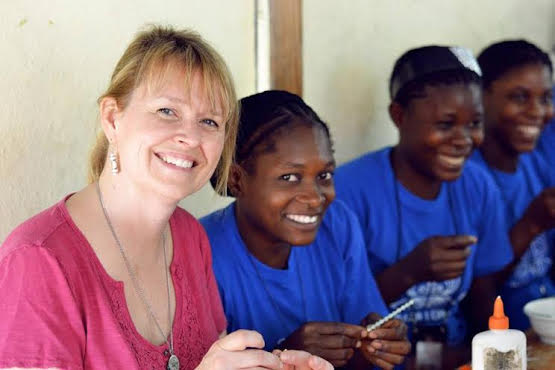Fair trade helps those in poverty

Colleen Biegger, compassion entrepreneur at Trades of Hope, worked with women in Haiti to make beads for jewelry from cereal boxes. One recycled cereal box makes $40 worth of jewelry.
April 14, 2014
ISU students and alumni are exploring a growing alternative to sourcing items from other countries and turning to fair-trade methods as a way to purchase high quality products while giving back to the community they are purchasing from.
Amrut Sadachar, graduate student in apparel, events and hospitality management, explained that there are three main issues fair trade addresses when importing goods from other countries. These issues are economical, social and environmental issues.
The concept of fair-trade is trying to eliminate these issues.
“There are different agencies which are involved. In the U.S., there are mainly two agencies,” Sadachar said.
He explained that agencies such as the Fair Trade Federation and the World Fair Trade Organization approve and certify fair-trade organizations and products.
One of these certified organizations is a mission based company called Trades of Hope.
Trades of Hope purchases and sells handmade merchandise, such as jewelry, journals, accessories and home decor created by women who live in poverty.
Colleen Biegger, compassion entrepreneur at Trades of Hope and Iowa State alumna, said she loves the idea that Trades of Hope empowers women and gives them jobs.
Biegger said women in many countries are not protected by a minimum wage requirement like U.S. citizens are and are often forced into labor work because they have no other choice.
She explained many women in poverty carry the burden of deciding whether they should give their children up for adoption or let them starve due to their lack of money and resources.
“It’s either make a dollar a day or make nothing at all,” Biegger said.
Beigger adopted her daughter from China, so this issue is very close to her heart.
Sadachar has recognized this issue as well.
“Let’s say the U.S is importing something — they don’t care whether their prices are fair to the suppliers,” Sadachar said. He then added that unfair wages are forcing economic issue in many countries, something fair-trade is trying to eliminate.
During a visit to Haiti last February, Biegger got to see the progression of fair-trade in action. Biegger discovered that Trades of Hope has enabled Haitians to earn up to six times as much money as they would have normally made in Haiti.
“The normal income for a Haitian is a dollar a day,” Biegger said. “They’re [now] making up to 14 dollars a day.”
Biegger said the products these women are making are very environmentally friendly. Some of the jewelry is even made out of recycled cereal boxes.
“They take recycled cereal boxes and they wind them into little beads,” Biegger explained.
Claire Kean, junior in apparel, merchandising and design, has also gained experience with the fair-trade industry when she interned at Worldly Goods — a fair-trade store in Ames — last summer.
“I’ve been so blessed to be so well off. I think that we should help the people that aren’t as well off in other countries that really struggle to survive,” Kean said.
Kean will intern in Ghana, Africa at Global Mamas this summer where she will get more hands on experience with the fair-trade industry.
Kean said she hopes to open her own business someday where she can incorporate the practices of fair trade.
“I just want to help them be able to create their lives,” Kean said.
Kean pointed out that while the industry is growing, it is still pretty small and it is important to raise awareness to the issue.
“So many people, they’ll buy things, they’ll buy clothes and not the story behind it at all or care about it because they care about what’s in their wallet and getting the best value for it,” Kean said.
Kean, Biegger and Sadachar all emphasized the importance of bringing awareness to the fair-trade issue.
“Just as we become more aware of being green and doing things for our environment we also need to become more aware of where a product comes from,” Biegger said.
Biegger said she hopes that other U.S. businesses can step away from sourcing products from other countries and look into the benefits of fair-trade.
“Every product will be manufactured in a way that economical, social and environmental aspects are taken care of,” Sadachar said about his hope that one day it will not be necessary to certify fair-trade products.
“It’s going to take a long time,” Sadachar admitted. “It’s just a start.”






